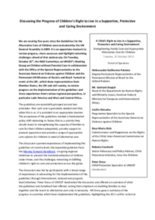On Tuesday, October 22rd, the NGO Committee on UNICEF’s Working Group on Children without Parental Care in collaboration with the Office of the Special Representative to the Secretary-General on Violence against Children and the Permanent UN Missions of Austria and Brazil hosted an event at the UN, which drew representatives from Member States, the UN and civil society, to review progress on the implementation of the guidelines and share experiences from various regional perspectives, in particular Latin America and West and Central Africa. The discussion spanned experiences of implementing the guidelines at country level, the expanded guidance from the Moving Forward Handbook, on-going regional initiatives to prevent the institutionalisation of children under three, and the challenges remaining in fulfilling children’s right to care and protection across the globe.
Ambassador Guilherme Patriota from Brazil opened the program and highlighted his country’s experience in identifying the areas of policy and implementation that required the most attention, and how the guidelines had given direction and inspired youth participation within its reforms. Rosa María Ortiz from the Inter-American Commission on Human Rights spoke about an upcoming report of the Inter American Commission on Human Rights on children’s rights to family care and alternative care that demonstrates the integration of the guidelines within the Human Rights frameworks of the Americas. The report emphasizes that special protection measures are required to respond to the separation of children from their family through transparent, legal and due process mechanisms in line with the protection of their rights. Cecilia Anicama, from the Office of the Special Representative of the Secretary General on Violence against Children underlined that there is strong evidence showing that targeting efforts for their protection has worked in preventing violence against children, as well as producing a number of social and economic benefits. Ms. Anicama highlighted the call to action or Latin American and Caribbean states launched recently launched in Panama aimed at ending the placement of children under three years of age in institutions. Roberta Cecchetti from Save the Children presented the research findings from a new innovative participative research in West and Central Africa on informal alternative care. The research found that kinship care is a traditional coping mechanism that needs to be better supported to contribute to resilient communities who are more able to care for and protect children in the face of adversity. The discussion was concluded by Gerhard Doujak of Austria’s Ministry for European and International Affairs, who offered an overview of the road ahead in solidifying international and national legal frameworks and ensuring that families are equipped with the resources, tools, understanding and skills to provide strong and stable support and protection for children.

